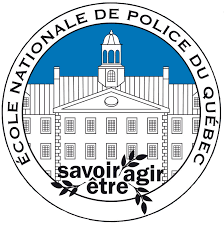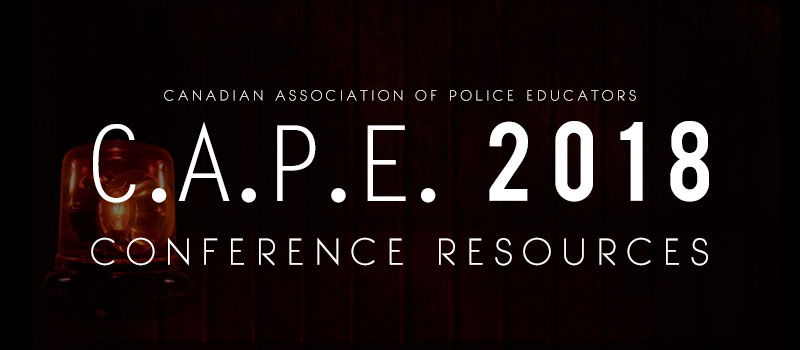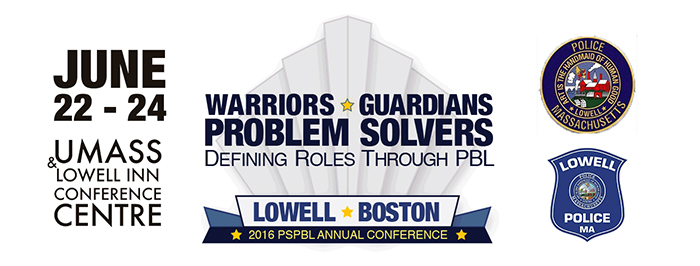Events
2019 Annual Conference | Connecting Research, Technology and Police Training.
2019 Annual Conference | Connecting Research, Technology and Police Training.

Connecting Research, Technology and Police Training.
On behalf of all of the CAPE Executive we would like to invite you and your colleagues to attend the 2019 CAPE Conference. We are excited to announce that the conference agenda has been finalized and official registration is OPEN. We have a number of outstanding speakers committed to Quebec City. We are thrilled to announce that Dr. Querine Hanlon and Dale Sheehan, M.O.M. will be kicking off the conference as our opening keynote speakers. Dr. Hanlon is the President of the Strategic Capacity Group and has an extensive CV including work with US Military, National Defense University and US Department of State. Some of you will recall Dale Sheehan as a past CAPE President and INTERPOL’s first Director of Police Training and Development.
We’re also excited by the outstanding researchers/presenters that are included in the brochure, some of which include Dr. Judith Andersen, Dr. Peter Collins, Dr. Craig Bennell, Human Factors and Cognition Scientist J.F. Gagnon among many others. We also have a number of other police professionals from Canada, the US and Denmark lined up to share their research and best practices with you. We know the exciting line-up of speakers will make this the conference to attend in 2019.
Keynote Speakers

Dr. Querine Hanlon
Dr. Querine Hanlon is the founding President of Strategic Capacity Group (SCG). Dr. Hanlon is an expert on security sector reform (SSR) and has published and worked extensively on Arab Spring transitions in North Africa.
Dale L. Sheehan
Dale L. Sheehan M.O.M., is the Special Advisor for International Cooperation at Strategic Capacity Group (SCG), where he leads SCG’s efforts to promote capacity building through international partnerships and provides expert guidance to SCG’s Academies of Excellence program.

Conference Details
“All group reservations will be made by individuals directly to hotel’s reservations department at (800) 267-2002. To ensure that all reservations are properly coded to your group room block, it is imperative that attendees provide the name of your group Canadian Association of Police Educators when making your reservation. Reservations must be received by May15th, 2019. After this date any unused rooms in your block will be released back to general hotel inventory.”
- * Theme is CONNECTING RESEARCH, TECHNOLOGY AND POLICE TRAINING
- Through the outstanding leadership of the Director of Conferences, Steve McCartney, and ENPQ’s Marc Desaulniers, the conference agenda meets the demands of our theme. Part of the ‘connecting theme’ will have delegates shuttled to the state of the art facility, Ecole nationale de police du Quebec in Nicolet. A tour of the facility and presentations will continue at ENPQ before returning to Hotel PUR.
- * Registration will be $600. This will include: breakfasts, lunches, snacks at breaks, COACH bus to ENPQ- and return, and banquet dinner on Wednesday evening back at Hotel PUR.
- * All individual reservations for Hotel PUR can be made through the hotel’s reservations department at 1- (800) 267-2002. To receive the group discount and to ensure that all reservations are properly coded to your group room block, it is imperative that attendees provide the name of the Canadian Association of Police Educators when making your reservation. Reservations must be received by May 15th, 2019. After this date any unused rooms will be released back to general hotel inventory.
- * Air Canada has provided a discount of 10% to our members for flights to the conference, please use Promotional Code 996F9HJ1
- * Registration will be available through our website (This registration is courtesy our partners at CPKN).
Presentations
Conference Speakers
Conference Co-Hosts

École nationale de police du Québec

Service de police de la Ville de Québec
C.A.P.E. 2018 Conference | Pracademics – Bridging the Gap Between Academia & Police Training
C.A.P.E. 2018 Conference | Pracademics – Bridging the Gap Between Academia & Police Training

Pracademics
Bridging the Gap Between Academia & Police Training
Location: Chilliwack, British Columbia
Date: June 25 – 29
Conference Details
Location
Accomodations
Reservations for the CAPE Conference 2018 are available to reserve from June 25, 2018 – June 29, 2018.
Price is $138.60 tax inclusive, includes meals beginning with dinner on the day of arrival to lunch on the day of departure.
Check-in time is 4 pm; check out is 12 pm. You must cancel your reservation 48 hours prior to the day of arrival to avoid the penalty of one-night room and tax charged to your credit card.
C.A.P.E. 2017 Conference
Atlantic Police Academy Presents
C.A.P.E. 2017 Transforming Canada’s Police Training and Education
![Transforming Canada's Police Training and Education - CAPE 2017 Conference <![CDATA[]]>](http://www.cape-educators.ca/wp-content/uploads/2016/09/conference_2017-1.jpg)
Engage, Inform and Advocate
Date: June 12 - 16
In the past several decades Canada has an established reputation as having a “system” of police and public safety that is considered to be amongst the best in the world. This is a most significant accomplishment given Canada’s has a complex multi-layered System of governance. In Canada the Federal, Provincial and Local Governments as well as First Nations all have significant roles and responsibilities when it comes to police and Public safety.
However in most recent years the “dynamics” of a rapidly changing world combined with unprecedented threats to public safety has raised the alarm that our prized System of Policing will not be sustainable. When one considers “policing” must take into account the competing Government priorities of Health Care, Education, Environment, and crumbling Infrastructure it becomes obvious the “pressure to deliver more with less” will only increase in the years ahead. The challenge to all Police leaders becomes even more daunting when we take into account the borderless nature of the crimes we are expected to prevent or solve.
There is no blueprint for moving forward and given the wicked daily demands on police leaders there is scarcity time to reflect and consider our “next steps”.
It is the desire of CAPE that the 2017 Conference will accomplish (2) objectives. First as always is to provide an environment to renew, refresh working relationships with Police Trainers and Educators from across Canada. Secondly is to provide an important opportunity to Engage, Inform and Advocate on what we believe are the key elements in a blueprint for Transformative Change.
For more information please contact Wayne Jacobsen at JacobseW@assiniboine.net.
Registration fee: $500
Register by Thursday June 1, 2017.
Registration must be received by Thursday June 1, 2017. The conference is expected to sellout, however, and some events have maximum capacities. Please submit the form, attached to this article, before the deadline.
The registration form will be available in February 2017 on the C.A.P.E. website: www.cape-educators.ca.
Conference: Monday, June 12 2017 18:30 – Friday, June 16 2017 10:15
We would appreciate if you could provide us with your arrival dates and times to the Charlottetown Airport.
Registration Includes
– Wine & Cheese reception at the Meet & Greet Monday evening
– Daily morning and afternoon refreshment breaks
– Lunches on Tuesday, Wednesday and Thursday
– Banquet Thursday evening
Location
Conference Details
Warriors, Guardians, Problem Solvers | Defining Roles Through PBL
Warriors, Guardians, Problem Solvers | Defining Roles Through PBL Police Society for Problem Based Learning Annual Conference

Police Society for Problem Based Learning Annual Conference
We are pleased to announce preliminary information for the 2015 PSPBL Annual Conference!
The Lowell Massachusetts Police Department will host the 2016 Annual Conference June 22, 23 & 24, 2016.
Boston Police Commissioner, Edward F. Davis, will be our Keynote Speaker.
Problem Based Learning
Problem Based Learning Certification
Registration Form More Information
The course will be taught using a state-of-the-art educational approach. Problem Based Learning is student-based and uses real-life problems to help students learn to how to solve problems and think in creative ways. The two-week session will be facilitated by Gerry Cleveland and Greg Saville of the Police Society for Problem Based Learning.
Problem Based Learning (PBL) is a state-of-the-art educational approach originally used by medical schools. PBL has emerged as a dynamic and engaging form of learning. This 10-day course is learner focused, built upon the “ill-structured problem” and provides instructors with practical applications of how to engage students in problem solving, critical thinking and team work.
The sessions will consist of full days with group assignments and required evening work. There is also an online pre-course assignment and a field exercise that must be completed prior to the start of the course.
On successful completion of this course, candidates will receive certification as problem based learning instructors.
September 12 – 23, 2016
8:30 a.m.-4:30 p.m (Monday to Friday)
Canadian Forces Military Police academy
CFB Borden – Borden, Ontario
*Fee includes handouts, texbooks, and refreshments.
This is a 2 weeks course.
To register please e-mail or fax with payment method. For more information:
ATTN: Wayne Jacobsen
Fax: 204.728.8740
E-mail: jacobsew@assiniboine.net
Payment Types:
- Cheque
- Money Order (Canadian Funds)
- Visa
- Mastercard
- Invoice to Company
- Cash